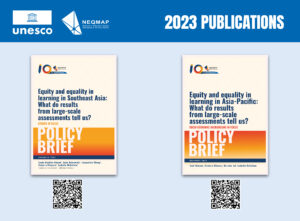In the Philippines, the needs, capacities and diverse circumstances of learners with special educational needs (LSENs) are carefully studied and given a special attention. With the implementation of its 12-year basic education program, the country has a goal in mind – to equalize learning opportunities to all learners, and produce “holistically developed Filipinos” in the long run.
Anchored on the mandate of this reform, the Department of Education (DepEd) of the Philippines developed an assessment framework for student learning that is aligned with the enhanced curriculum. Published in 2016, the policy on the National Assessment of Student Learning (NASL) or DepEd Order 55, series 2016, covers different aspects of education and highlights the importance of providing quality educational service to LSENs.
In previous years, LSENs were excluded in national assessments in the country for varied reasons such as lack of appropriate assessment tools and the appalling effect of their test scores in the national average. In the NASL policy, LSENs are described as “those who require special education services and modification of school practices to access educational opportunities and the general education curriculum. They include those who have difficulty seeing, hearing, walking or climbing steps, remembering or concentrating, and communicating”(Department of Education, 2016, p. 2).
With profound concern and determined efforts to promote the rights of LSENs, and to measure their progress in the attainment of curriculum learning standards, three assessment reforms for LSENs were featured in the NASL: (1) their inclusion in all national assessments, (2) the prescription test accommodations for them, and (3) the provision of their own test performance profile.
In Section 9 of the policy (p. 26), test accommodations are prescribed as follows:
- Separate, accessible testing room situated at the ground floor near clean and accessible restrooms. They must be grouped according to difficulty;
- Double the time for test taking. This is to give them ample time to read and answer the test;
- Flexible rules such as allowing test takers to stand up once in a while or get out of the room for those who have difficulty concentrating;
- Personal assistant must be allowed to help those with difficulty walking/moving/climbing steps;
- Qualified sign language interpreters who shall ensure that all spoken instructions during testing are adequately interpreted to those who have difficulty hearing;
- Alternative test formats (Braille, large print, audio, electronic);
- For examinees with difficulty seeing, alternative response formats can be used, such as oral type wherein an examiner reads the test items to the examinee and a scribe shades the answers in the scannable answer sheet. These alternative formats may also be used by other learners as needed;
- Appropriate test furniture (table, chair).
At the national level, DepEd also issued an assessment tool for screening the special educational needs of learners in schools. Released in 2018, the implementation of the Multi-Factored Assessment Tool (MFAT) in regular schools is mandated by the Ministry through DepEd Order 29, series 2018. As described in the policy, the MFAT will be used to assess the first graders “who may exhibit developmental advancement or delays or have manifestations of learning disability.” Assessment results will be used for education and medical/allied services intervention as well as for planning and designing appropriate instructions.
On November 2018, the Bureau of Education Assessment at DepEd conducted an inclusive policy development workshop on “Deaf education roadmap” that involved both the hearing and non-hearing experts and stakeholders. The workshop discussed and addressed the need to review the appropriateness of paper-and-pencil national assessments. One of the recommendations came out from the discussions is to aide written tests with sign language. The Ministry of Education should take this recommendation into account in the long-term planning in order to promote inclusion and equity in national assessments.
Written by Nelia V. Benito, PhD, CESO IV [nelia.benito@deped.gov.ph] and Danilyn Joy L. Pangilinan [danilyn.pangilinan@deped.gov.ph], Bureau of Education Assessment, Department of Education
Related links:
https://www.ncda.gov.ph/disability-laws/republic-acts/republic-act-7277/
https://www.officialgazette.gov.ph/2013/05/15/republic-act-no-10533/
Photo credit: @UNESCO/D.Riewpituk






